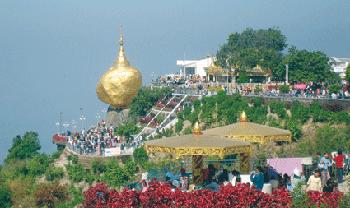The ‘Sherpas’ of Burma
By KYI WAI
The Irrawaddy News
KYAIK HTI YOE—After paying homage to the pagoda, 14-year-old Than Naing bent down and hooked over his shoulders the straps of the huge bamboo basket—which was almost the same size as himself. His knees almost buckled as he pushed himself up from a squatting position. He wobbled for a minute, getting his balance. Then he set off from the famous Kyaik Hti Yoe Pagoda back down the hill.
Pilgrims and tourists coming to this world-famous Buddhist pagoda in Burma’s Mon State are forced to endure a steep 2-kilometer climb to the top of the hill where the photogenic golden rock and pagoda stand precariously overlooking a cliff.
Almost invariably, visitors prefer to hire porters to carry their bags, picnics and assorted offerings for them. After all, it’s a breathless enough journey without having to carry your bags as well.
Elderly family members or those too unfit to manage the ascent by foot can hire a porter to carry them up too. For a US $8 fee, four porters will carry him or her in a hammock suspended from a bamboo pole on the one-hour pilgrimage to the top, wait for them to pray, make merit and take photos, then carry them back down again.
Most of approximately 400 porters are local residents of Kyaik Hti Yoe. Their ages range from 13 to about 70. To qualify as porters, they must register at the labor office where they are issued a blue shirt with an official registration number on the chest.
For each trip, the porters receive a standard fee of 4,500 kyat ($4.50). From this, the labor office deducts a 500 kyat ($ 0.50) “tax,” so the porter takes home 4,000 kyat ($ 4) for each trip he or she can manage.
Four porters carrying a person to the pagoda will receive 2,000 kyat ($2) each, but again they must deduct 500 kyat each time for the labor office.
The labor office at Yathei Hill organizes the tours and coordinates the visits to Kyeik Hti Yoe Pagoda with the tour groups and drivers. They maintain a fairly rigid system and if customers complain about a particular porter, he or she will most likely be suspended for 10 days as a punishment.
With more than 400 porters vying for business, many go home each day penniless.
The busiest time of the year for pilgrims to the site is during the religious festival of Tazaung Mone in November.
But sometimes in rainy season, barely a single pilgrim will visit the pagoda. Outside the holiday season, many porters have to find alternative jobs.
Some of the porters use their unemployed time during the rains to scavenge the nearby mountains for herbal tree roots and fruit to sell at the market. Others work as farm hands.
In the off-season, Than Naing cuts down bamboo plants near his village, then chops them up and sells the bamboo to souvenir shops. But he only earns 100 kyat ($0.10) per plant and can barely manage five plants a day.
With six persons in the family, Than Naing’s mother must spend an average of 3,000 kyat ($3) per day on basic meals alone. Than Naing knows his salary from cutting bamboo is not enough.
On the other hand, working as a porter at Kyaik Hti Yoe Pagoda earns him in the region of 4,000 kyat ($4) to 8,000 kyat ($8) per day.
“As long as Kyaik Hti Yoe is standing, we’ll never starve,” he said confidently.
But while the energetic teenage porters bound up and down the hill happily three times a day, the veterans of the trade, some of whom have been doing the job for 40 years, get exhausted after one trip.
Aware of the steepness of the hill, most visitors prefer to choose young porters. More often than not, the “old boys” will spend several days sitting in the shade of the trees waiting for an officer to call their registration number.
“I’ve been working here for more than 40 years,” said 68-year-old porter Bo Aye. “I can carry any amount of baggage from Kinpun Point to the pagoda or even from Yathei Hill to the pagoda. But the visitors seldom hire me.”
Bo Aye said that, in the past, he could always earn enough as a porter to feed his family of four. But now he only gets work perhaps one day out of three or four, and is unable to provide for his family. His eldest son joined the military and died in battle when he was 17, but a younger son is also a porter.
“Some of the older porters want to retire or open a shop because they can no longer climb the hill every day,” said a 30-year-old woman, one of the few female porters at Yathei Hill. “Sometimes, they get exhausted by mid-journey and another porter has to take their load.”
She said the porters generally believe that by carrying the bags of Buddhist pilgrims they are not only making money, but making merit too.
“But I don’t want to work as a porter my whole life,” she said. “It’s very hard work.
“Each time I reach the top of the hill I pray at the pagoda that I can save enough money to quit this job and open a stall at the market.”
READ MORE---> The ‘Sherpas’ of Burma...
















